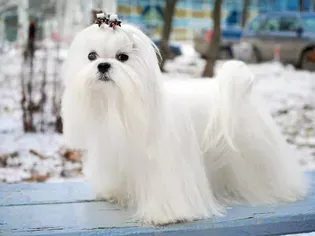Maltese: Dog Breed Characteristics & Care
Updated on 05/26/24

Unveiling the Maltese: A Guide to the Aristocratic Canine Companion
Introduction:
Step into the realm of elegance and charm as we explore the Maltese, a breed that has captivated hearts with its pristine white coat and endearing personality. This comprehensive guide will delve into the Maltese's captivating characteristics, unravel their unique needs, and equip you with the knowledge to provide an exceptional life for your loyal companion.
Section 1: Physical Attributes and Temperament
Appearance:
* Coat: The Maltese's striking white coat is its hallmark. Long, silky, and flowing, it requires regular brushing and grooming to maintain its pristine appearance.
* Size: Maltese are typically classified as a toy breed, weighing between 4-7 pounds and standing 8-10 inches tall. Their petite size makes them ideal for apartment living and travel.
Temperament:
* Affectionate: Maltese are renowned for their exceptional love and loyalty. They adore their human companions and thrive on attention.
* Playful: Despite their small stature, Maltese are energetic and playful. They enjoy games, walks, and interactive toys.
* Gentle: Maltese are known for their gentle nature, making them excellent companions for families with children and other pets.
Section 2: Health and Care
Health Concerns:
* Eye issues: Maltese are prone to certain eye conditions, such as cataracts and dry eye. Regular veterinary check-ups are essential for early detection and treatment.
* Dental problems: Maltese have small mouths, which can increase their risk of dental disease. Regular brushing and dental cleanings are crucial to maintain oral health.
* Skin allergies: Maltese may be sensitive to certain allergens, which can cause skin irritation and itching. Hypoallergenic products and a limited-ingredient diet can help manage allergies.
Care Requirements:
* Grooming: Maltese require regular brushing and grooming to prevent mats and keep their coat healthy. Baths should be given as needed, using gentle shampoos and conditioners.
* Exercise: While Maltese are not extremely active, they require daily walks and playtime to maintain their physical and mental well-being.
* Diet: Maltese should be fed a high-quality diet specifically formulated for small breeds. Avoid feeding them table scraps or excessive treats.
Section 3: Training and Socialization
Training:
* Potty training: Maltese are generally easy to potty train, but patience and consistency are key. Use positive reinforcement and establish a regular potty schedule.
* Basic obedience: Maltese are intelligent and eager to please. Start training early to teach them basic commands like sit, stay, and come.
* Socialization: Early socialization is crucial for Maltese to develop good manners and prevent behavioral problems. Expose your puppy to different people, animals, and environments.
Section 4: Breed Variations
Parti-colored: Maltese with parti-colored coats have patches of color, typically brown or apricot, on their ears, face, or body.
Teddy bear cut: This popular grooming style gives Maltese a teddy bear-like appearance with a rounded body and short, fluffy coat.
Section 5: Conclusion
The Maltese embodies grace, affection, and playful charm. With their elegant appearance, gentle nature, and adaptability, they make exceptional companions for those seeking a devoted and loving companion. By providing proper care, training, and socialization, you can create an unbreakable bond with your Maltese and ensure their lifelong happiness.
Additional Tips for Maltese Owners:
* Consider pet insurance to cover unexpected veterinary expenses.
* Provide plenty of chew toys to satisfy their chewing needs and prevent boredom.
* Keep your Maltese's environment clean and free of allergens to minimize skin irritation.
* Don't overfeed your Maltese as they are prone to weight gain.
* Consult with a veterinarian regularly for health check-ups, vaccinations, and parasite prevention.
Remember, a well-cared-for Maltese will bring years of joy, companionship, and unconditional love to your life.
Explore More Pets

Basic Training
Puppy and Baby Introductions

Working Dog Breeds
All About Search and Rescue Dogs

Dog Treatments
Puppy Vaginitis: Signs, Causes and Treatment

Dog Adoption
After More Than 1,200 Days in the Shelter, Coco Goes Home

Basic Training
How to Train Your Puppy to Go on Potty Pads

Hybrid Dog Breeds
The Difference Between a Mutt, Mixed Breed, or Designer Dog?

Dog Treatments
Nail Problems in Dogs

Puppies
7 Reasons Why Two Dogs Are Better Than One
